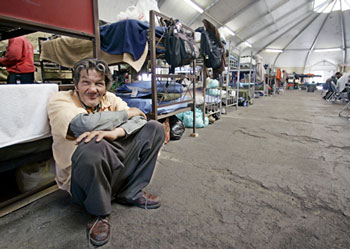Domestic disputes leave Iraq war veterans homeless
By Aaron Glantz | Last updated: Jun 30, 2007 - 2:21:00 PMWhat's your opinion on this article?
- When I Come Home (Documentary Video Clip)

Daniel Machado, from Los Angeles and a Vietnam era veteran, leans against a bunk at a homeless shelter for veterans in San Diego, positioning himself to be at the front of the food line, Wednesday, March 28. With warmer weather arriving, the giant tent that was a winter home for 150 veterans is being packed away. No one knows for sure how many homeless veterans there are, estimates vary from hundreds of thousands to millions. According to the Department of Veterans Affairs, there are about 195,000 homeless veterans on any given night. Photo: AP/World Wide Photos
|
LOS ANGELES (IPS/GIN) - Veterans of the Iraq war are becoming homeless more quickly than veterans from Vietnam, largely due to domestic conflicts and custody disputes that happen upon their return.
“What’s unique about the men and women coming back from Iraq and Afghanistan is that they’re not able to integrate with their family,” said Rachel Feldstein, the associate director of New Directions, a residential care center for homeless veterans in West Los Angeles. “They’ve seen horrible things. They’ve been in horrible places and their family can’t relate. And so they become homeless.”
The U.S. Vets Westside Residence Hall, where New Directions is based, is a hulking eight-story structure a few blocks from Los Angeles International Airport. It’s the largest transitional housing and employment center for homeless veterans in the country, hosting 700 veterans annually.
Michael Hall is one of its residents. The 31-year-old Army staff sergeant enlisted shortly after high school and served as a heavy equipment mechanic and technical weapons specialist in Bosnia, Cuba, Kuwait and Afghanistan before being severely injured in Iraq in 2003.
The federal government’s Department of Veterans Affairs considers Mr. Hall to be 100 percent disabled. He has difficulty walking, dragging his feet with each step he takes. He also suffers from mental problems—bipolar disorder and post-traumatic stress disorder (PTSD)—conditions he didn’t have before he went to Iraq.
Mr. Hall said his problems really started when he got back to the United States and started using methamphetamines to dull the pain.
Mr. Hall has four children, ages 7, 4, 2 and 1, but his behavior since being released from the military has kept him away from them. In addition to using drugs, he started dealing them, as well. Since leaving the military in 2003, he has served time in federal prison in Oklahoma for felony home invasion and has had numerous other run-ins with the law. Within three years, he hit rock bottom and became one of 27,000 homeless vets on the streets of Los Angeles.
“These are guys who are pretty much going straight from deployment to the streets,” Ms. Feldstein said, adding that veterans of the Iraq war are becoming homeless much more quickly than Vietnam vets.
While about half of the estimated 400,000 homeless veterans served during the Vietnam years, Ms. Feldstein said most did not usually become homeless until nine to 12 years after their discharge.
Already, she said, Iraq war vets are living on the streets of Los Angeles, getting seriously addicted to drugs and falling into criminal behavior, she said.
Firm estimates of the number of homeless Iraq war veterans are hard to come by. In June 2005, the National Coalition for Homeless Veterans reported the number of Operation Iraqi Freedom and Enduring Freedom (Afghanistan) veterans seeking assistance from community-based homeless services providers had exceeded 400.
The group Veterans for America, formerly the Vietnam Veterans of America Foundation, estimates that 10,000 veterans of Iraq and Afghanistan are now living on the street.
Activists concerned about increases in the number of homeless veterans argue for greater federal investment in affordable housing and social services. Of particular concern is the wait for mental health care, which can run as long as six months.
A recent study by Harvard’s Kennedy School of Government found that by the time the Iraq and Afghanistan wars end, there will be at least 2.5 million vets. Because of that, the Harvard study concluded, Congress will have to double the Veteran Administration’s budget simply to avoid cutting services.
INSIDE STORIES AND REVIEWS
-
-
About Harriett ... and the Negro Hollywood Road Show
By Rabiah Muhammad, Guest Columnist » Full Story -
Skepticism greets Jay-Z, NFL talk of inspiring change
By Bryan 18X Crawford and Richard B. Muhammad The Final Call Newspaper @TheFinalCall » Full Story -
The painful problem of Black girls and suicide
By Charlene Muhammad -National Correspondent- » Full Story -
Exploitation of Innocence - Report: Perceptions, policies hurting Black girls
By Charlene Muhammad -National Correspondent- » Full Story -
Big Ballin: Big ideas fuel a father’s Big Baller Brand and brash business sense
By Bryan Crawford -Contributing Writer- » Full Story






 Click Here Stay Connected!
Click Here Stay Connected!








